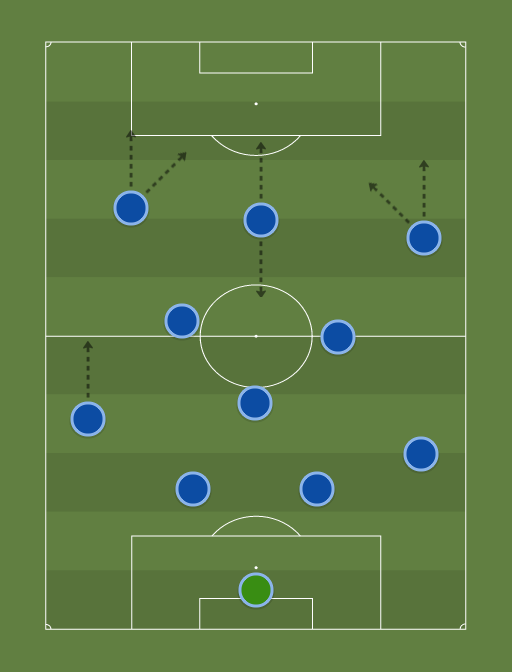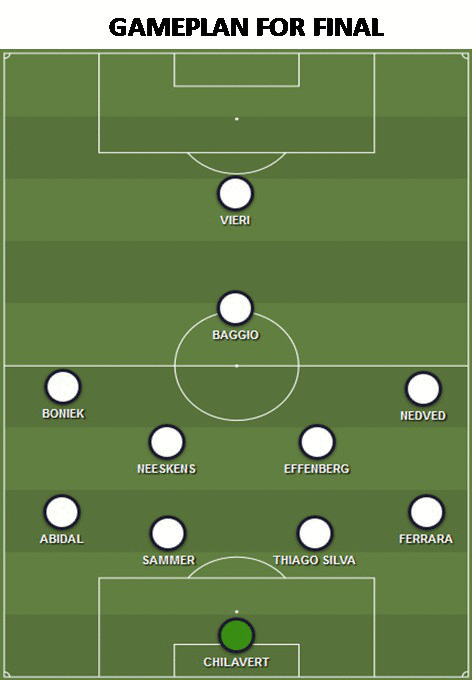Frantisek Planicka - Regarded as the best keeper about during 1930's
Few players in the history of football have made more appearances for a single club than Czech goalkeeping legend František Plánička. In a sixteen year career, he made nearly 1,000 appearances for Slavia Prague as well as amassing a then-world record number of international appearances. Renowned for his excellent reflexes and shot-stopping ability, he is considered one of the finest goalkeepers of the pre-Second World War era.
Plánička was born in Prague, at the time part of the Austro-Hungarian Empire, on 2 June 1904. He would spend the majority of his career, and indeed of his life, in the city. At just 5'8" tall, Plánička was relatively short for a goalkeeper but his acrobatic displays on the pitch led to him being nicknamed 'The Cat of Prague'. As a teenager, he appeared for Slovan Praha VII, Union VII, Staroměstský SK Olympia and SK Bubeneč.
In the early 1920s Plánička attracted the attention of the leading clubs in Czechoslovakia, and was linked with both Sparta and Slavia Prague. Turning down Sparta, he eventually moved to Slavia in 1923 where he initially had to compete for the position of first choice goalkeeper with the older, more experienced Josef Štaplík. Gradually it was Plánička who became the regular starter in goal, a position which he would hold virtually unchallenged for the remainder of his career.
In 1925, Czechoslovakia's first professional league began and Plánička earned the first title of his career when Slavia claimed the championship by the narrowest of margins ahead of Sparta. He was developing a reputation as the country's leading goalkeeper, and made his debut for the national team in January 1926, in a 3-1 defeat to Italy. Slavia lost their league title in 1926, finishing a close second to Sparta, and would also finish as runners-up in each of the next two seasons, but the cup would bring more success.
From 1926 to 1928, the club enjoyed three consecutive cup wins with Plánička keeping a crucial clean sheet in the 1-0 win over Sparta in 1927. The 1928-29 season brought a second league title, and marked the beginning of the most successful period of Plánička's career. In 1929-30 they won all 14 league matches, and with Plánička in goal conceded just 13 goals in those games, a remarkably low ratio for that era. That season also saw him gain a fourth cup winner's medal after a 4-2 final victory over SK Kladno.
Moving into the 1930s, Plánička and Slavia continued to dominate football in Czechoslovakia, picking up at least on trophy every year up to 1935. They completed a hat-trick of league titles in 1931, won the cup again in 1932 and then added three more league titles from 1933 to 1935, the last of those forming part of another league and cup double. In the space of a just a decade, Plánička had won seven league titles and six domestic cups. At international level, he played in seven of Czechoslovakia's eight games in the first Central European International Cup, but the team fell just short of the title. Plánička was denied the chance to play in the first World Cup as like many European countries, Czechoslovakia declined to enter the tournament in Uruguay in 1930 but his opportunity would come four years later.
At the 1934 World Cup in Italy, Plánička was firmly established as the captain of Czechoslovakia and led his team through tough matches against Romania and Switzerland to reach the semi-finals, coming from behind each time. In the semi-final a hat-trick fromOldřich Nejedlý took Czechoslovakia through and gave Plánička the opportunity to lead his team out in the final. That match pitted him against another of the world's finest goalkeepers, Gianpiero Combi of Italy. For a long time, both men kept their goals in tact and when Czechoslovakia took the lead with 19 minutes to go it appeared that Plánička was about to get his hands on the Jules Rimet Trophy. Nine minutes from time, however, he was finally beaten and with the match going into extra-time, Italy scored again to deny Plánička and Czechoslovakia the world title.
Plánička remained a regular in the national team for the next four years, and further domestic success came with an eighth league title in 1937. In 1938, Slavia reached the final of the international club competition the Mitropa Cup, where they faced Hungarian side Ferencváros. After a 2-2 draw in the first leg, Plánička kept the Hungarians at bay in the second match where a 2-0 win gave him yet another major trophy.
1938 would also bring another opportunity for World Cup success, with a crushing 6-0 win over Bulgaria earning Czechoslovakia a place in the finals in France. Plánička was again the captain of his country, and kept his first World Cup clean sheet in the first round game against the Netherlands, which Czechoslovakia won 3-0 after extra-time. That win took them through to a quarter-final against Brazil in Bordeaux, a match which would turn out to be highly controversial and eventually prove to be the last of Plánička's international career.
The match descended into violence, with two Brazilians and one Czech being sent off and several more being injured. Plánička was one of those to suffer, ending up with a broken arm. Remarkably, he played on through the pain to earn his team a replay but was not able to play in that match and without him, Czechoslovakia lost 2-1. He would never play another international, and played on for just one more year at club level before ending his playing career in 1939 at the age of 35.
In total, Plánička played 969 matches for Slavia Prague, with the club winning more than three quarters of those games. He appeared 73 times for Czechoslovakia, more internationals than anyone else had previously managed and a national record which stood until 1966. He played 1253 games in all across his career, conceding an average of 0.86 goals per game. In his retirement, he remained fit and active and even appeared for a senior team of former internationals in 1970, at the age of 66.
Much to his sadness, Slavia struggled to recapture their glory days in the post-war era and by 1994 were approaching half a century without a title. As he turned 90, Plánička's dearest wish was to see the club win one more title before he died. In 1996, his wish came true as Slavia won their first league title since 1947. Plánička died just two months later at the age of 92. By the time of his death, he was the last survivor of the 1934 World Cup final.
Virginio 'Vin' Rosetta was an Italian defender who could play either outwide or in the middle. Played for the Italy throughout the 1920s and through the first Central European cup which they won. Was part of the Juve team that won 5 league titles in a row. An article in Italian courtesy of hams -
http://ilpalloneracconta.blogspot.ru/2008/02/virginio-rosetta.html











